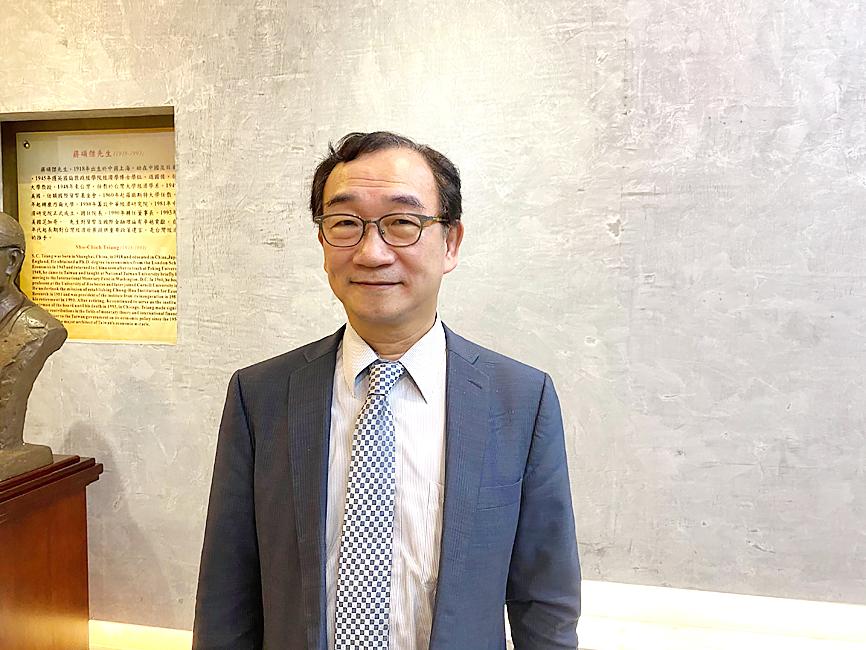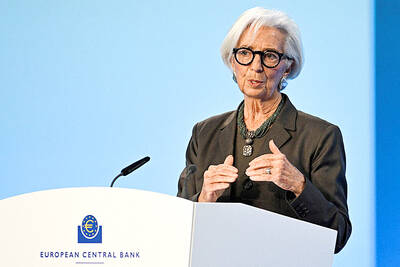The Chung-Hua Institution for Economic Research (CIER, 中華經濟研究院) has adjusted upward its forecast for economic growth for this year and next year, with the strength in exports this year giving way to stronger domestic demand next year.
CIER yesterday forecast that the economy would grow 2.38 percent this year and 3.73 percent next year, up from its October estimates of 1.76 percent and 3.42 percent respectively.
The economy hit bottom in the second quarter, when it was dragged down by the impact of the COVID-19 pandemic, but with the spread of the virus under control in Taiwan, the domestic economy gradually recovered in the third quarter and is set to register a “V-shaped” recovery, CIER vice president Wang Jiann-chyuan (王健全) said.

Photo: Wu Jia-ying, Taipei Times
The economy’s higher-than-expected growth this year would largely be driven by robust exports, but the main engine of growth next year would shift to robust domestic demand and consumption, Wang said.
However, attention should be paid to several trends expected to emerge in the post-pandemic era, such as “deglobalization” (encouraging investment and manufacturing closer to the target market), “debureaucraticization” (strengthening public governance and efficiency), and a more dominant digital economy, he said.
At the same time, Taiwan should try to assist its companies in upgrading their operations and rebuilding their supply chains to align with global trends, helping to make businesses the pillars of the domestic economy, Wang said.

European Central Bank (ECB) President Christine Lagarde is expected to step down from her role before her eight-year term ends in October next year, the Financial Times reported. Lagarde wants to leave before the French presidential election in April next year, which would allow French President Emmanuel Macron and German Chancellor Friedrich Merz to find her replacement together, the report said, citing an unidentified person familiar with her thoughts on the matter. It is not clear yet when she might exit, the report said. “President Lagarde is totally focused on her mission and has not taken any decision regarding the end of

French President Emmanuel Macron told a global artificial intelligence (AI) summit in India yesterday he was determined to ensure safe oversight of the fast-evolving technology. The EU has led the way for global regulation with its Artificial Intelligence Act, which was adopted in 2024 and is coming into force in phases. “We are determined to continue to shape the rules of the game... with our allies such as India,” Macron said in New Delhi. “Europe is not blindly focused on regulation — Europe is a space for innovation and investment, but it is a safe space.” The AI Impact Summit is the fourth

CONFUSION: Taiwan, Japan and other big exporters are cautiously monitoring the situation, while analysts said more Trump responses ate likely after his loss in court US trading partners in Asia started weighing fresh uncertainties yesterday after President Donald Trump vowed to impose a new tariff on imports, hours after the Supreme Court struck down many of the sweeping levies he used to launch a global trade war. The court’s ruling invalidated a number of tariffs that the Trump administration had imposed on Asian export powerhouses from China and South Korea to Japan and Taiwan, the world’s largest chip maker and a key player in tech supply chains. Within hours, Trump said he would impose a new 10 percent duty on US imports from all countries starting on

STRATEGIC ALLIANCE: The initiative is aimed at protecting semiconductor supply chain resilience to reduce dependence on China-dominated manufacturing hubs India yesterday joined a US-led initiative to strengthen technology cooperation among strategic allies in a move that underscores the nations’ warming ties after a brief strain over New Delhi’s unabated purchase of discounted Russian oil. The decision aligns India closely with Washington’s efforts to build secure supply chains for semiconductors, advanced manufacturing and critical technologies at a time when geopolitical competition with China is intensifying. It also signals a reset in relations following friction over energy trade and tariffs. Nations that have joined the Pax Silica framework include Japan, South Korea, the UK and Israel. “Pax Silica will be a group of nations